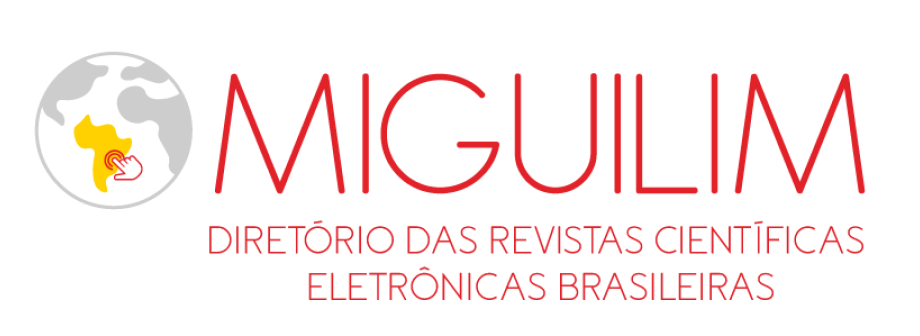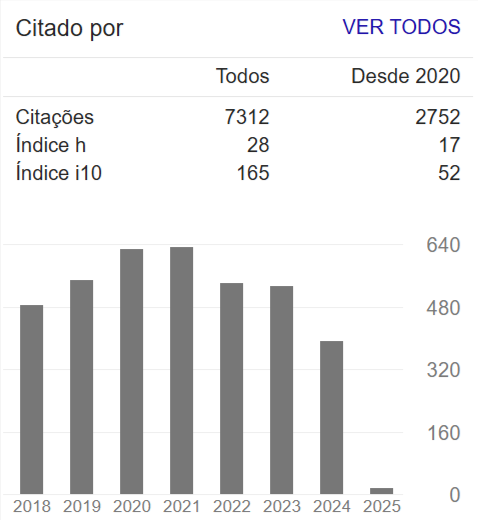Groundwater recharge favorability modelling by diffuse logic paradigm
Abstract
Geographic information is uncertain, which means that the boundaries between different phenomena are blurred or there is heterogeneity within a class, due to differences between geological, pedological, geomorphological, vegetal features and so on. Methods based on artificial intelligence (AI) provide specific solutions to the fuzzy nature of the real world based on expert-knowledge. The uncertain nature of the processes that control groundwater recharge in watersheds allows these methods to be applied in groundwater management, supporting planning and decision-making related with water use and protection of vulnerable areas. The aim of this work was to define favourable areas for groundwater recharge from variables related variables samples near monitoring wells in a watershed in an outcrop area of the Guarani Aquifer System (GAS). Fuzzy logic was used to define an inference system capable of spatially extrapolating the point data for the entire watershed. The output was a map of favourability to recharge based on variables related to the texture and management of soil, terrain features and vegetation. The synthesis map support both planning and decision making on land use considering hydrological processes in its surface and subsurface interfaces. From the results achieved, the discussion on the importance of ethical choices in the hydrogeology decision-making processes related to the use of AI-based methods is extended.
References
ALLEN, R. G.; PEREIRA, L. S.; RAES, D.; MARTIN, S. Crop eva-potranspiration. FAO, Irrigation and Drainage Paper, v. 56. Rome: FAO, 1998. 297 p.
DAS, B.; PAL, S. C. Combination of GIS and fuzzy-AHP for delineating groundwater recharge potential zones in the critical Goghat-II block of West Bengal, India. HydroRe-search, v. 2, p. 21-30, 2019. https://doi.org/10.1016/j.hydres.2019.10.001
DE VRIES, J. J.; SIMMERS, I. Groundwater recharge: an over-view of processes and challenges. Hydrogeology Journal, v. 10, n. 1, p. 5-17, 2002. https://doi.org/10.1007/s10040-001-0171-7
DEDECEK, R. A; GAVA, J. L. Influência da compactação do solo na produtividade da rebrota de eucalipto. Revista Árvo-re, v. 29, n. 3, p. 383-390, 2005. https://doi.org/10.1590/S0100-67622005000300005
DE GRUIJTER, J. J.; BRUS, D. J.; BIERKENS, M. F. P.; KNOT-TERS, M. Sampling for Natural Resource Monitoring. Berlin: Springer, 2006. 334 p. https://doi.org/10.1007/3-540-33161-1
DUHALDE, D. J.; ARUMÍ, J. L.; OYARZÚN, R. A.; RIVERA, D. A. Fuzzy-based assessment of groundwater intrinsic vulnerabil-ity of a volcanic aquifer in the Chilean Andean Valley. Envi-ronmental Monitoring Assessment, v. 190, 390, 2018. https://doi.org/10.1007/s10661-018-6758-4
EMBRAPA (Empresa Brasileira de Pesquisa Agropecuária). Manual de métodos de análise de solos. 2. ed. Rio de Janei-ro: EMBRAPA Solos, 1997. 212 p.
FEITOSA, E. C.; MANOEL FILHO, J.; COSTA, W. D.; FEITOSA, F. A. C.; DEMETRIO, J. G. A.; FRANÇA, H. P. M. Avaliação de recursos hídricos subterrâneos. In: FEITOSA, F. A. C.; MANO-EL FILHO, J.; FEITOSA, E. C.; DEMETRIO, J. G. A. Hidrogeolo-gia: conceitos e aplicações. Rio de Janeiro: CPRM/LABHID, 2008. p. 661-671.
GHAZAVI, R.; BABAEI, S.; ERFANIAN, M. Recharge wells site selection for artificial groundwater recharge in an urban area using fuzzy logic technique. Water Resources Management, v. 32, 3821, 2018. https://doi.org/10.1007/s11269-018-2020-7
HEALY, R.; SCANLON, B. Estimating groundwater recharge. Cambridge: Cambridge University Press, 2010. 256 p. https://doi.org/10.1017/CBO9780511780745
JENSEN, R. Introductory digital image processing: a remote sensing perspective. 4. ed. Upper Saddle River: Prentice Hall Press, 2015. 544 p.
KARAMOUZ, M. ; NAZIF, S. ; FALAHI, M. Hydrology and hydro-climatology. Principles and applications. Boca Raton: CRC Press, 2013. 742 p. https://doi.org/10.1201/b13771
KRESIC, N.; MIKSZEWSKI, A. (Eds.). Hydrogeological concep-tual site models: data analysis and visualization. Boca Ra-ton: CRC Press, 2013. 600 p. https://doi.org/10.1201/b12151
MAMDANI, E. H.; ASSILIAN, S. An experiment in linguistic synthesis with a Fuzzy Logic Controller. International Journal of Man-Machine Studies, v. 7, n. 1, p. 1-13, 1975. https://doi.org/10.1016/S0020-7373(75)80002-2
MANZIONE, R. L. Águas subterrâneas: conceitos e aplicações sob uma visão multidisciplinar. Jundiaí: Paco Editorial, 2015. 388 p.
MANZIONE, R. L.; WENDLAND, E.; TANIKAWA, D. H. Stochas-tic simulation of time-series models combined with geosta-tistics to predict water-table scenarios in a Guarani Aquifer System outcrop area, Brazil. Hydrogeology Journal, v. 20, n. 7, p. 1239-1249, 2012. https://doi.org/10.1007/s10040-012-0885-8
MANZIONE, R. L.; SOLDERA, B. C.; PAES, C. O.; WENDLAND, E. Analyses of water table depths variations in an outcrop area of the Guarani aquifer system in Brotas/SP-Brazil. IRRI-GA, Edição Especial, 20 anos Irriga + 50 anos FCA, p. 186-197, 2015. https://doi.org/10.15809/irriga.2015v1n1p186
MANZIONE, R. L.; MATULOVIC, M. Decision-Making in Groundwater Management: Where Artificial Intelligence Can Really Lead Geoscientists? In: ABRUNHOSA, M.; CHAMBEL, A.; PEPPOLONI, S.; CHAMINÉ, H. I. (Eds.). Advances in Geo-ethics and Groundwater Management: Theory and Practice for a Sustainable Development. Berlin: Springer, p. 441-445, 2021. https://doi.org/10.1007/978-3-030-59320-9_93
MOHAMED, A. K.; LIU, D.; MOHAMED, M. A. A.; SONG, K. Groundwater quality assessment of the quaternary uncon-solidated sedimentary basin near the Pi river using fuzzy evaluation technique. Applied Water Science, v. 8, n. 65, 2018. https://doi.org/10.1007/s13201-018-0711-0
MARONE, E.; PEPPOLONI, S. Ethical dilemmas in geoscienc-es. We can ask, but, can we answer? Annals of Geophys-Italy, v. 60, n. 7, AG-7445, 2017. https://doi.org/10.4401/ag-7445
NADIRI, A. A.; NADERI, K.; KHATIBI, R.; GHAREKHANI, M. Modelling groundwater level variations by learning from multiple models using fuzzy logic. Hydrological Science Journal, v. 64, n. 2, p. 210-226, 2019. https://doi.org/10.1080/02626667.2018.1554940
PAES, C. O. Influência do uso e manejo dos solos nos meca-nismos de recarga das águas subterrâneas em uma bacia hidrográfica em área de afloramento do Sistema Aquífero Guarani (SAG). Trabalho de Conclusão de Curso (Graduação em Geografia) - UNESP/Campus Experimental de Ourinhos, 110 p. 2012.
REYNOLDS, W. D.; ELRICK, D. E. A method for simultaneous in situ measur ements in the vadose zone of field satured hydraulic conductivity, sorptivity and the conductivity – pressure head relationship. Ground water monitoring review, v. 6, n. 1, p. 84-95, 1986. https://doi.org/10.1111/j.1745-6592.1986.tb01229.x
SILVA, C. O. F.; MATULOVIC, M.; MANZIONE, R. L. New dilem-mas, old problems: advances in data analysis and its geo-ethical implications in groundwater management. SN Ap-plied Sciences, v. 3, n. 607, 2021. https://doi.org/10.1007/s42452-021-04600-w
SCANLON, B. R., HEALY, R. W.; COOK, P. G. Choosing appro-priate techniques for quantifying groundwater rechar-ge. Hydrogeology Journal, v. 10, n. 1, p. 18-39, 2002. https://doi.org/10.1007/s10040-001-0176-2
TANIKAWA, D. H.; MANZIONE, R. L. Análise da correlação entre a resposta espectral da cultura de eucalipto e oscila-ção de níveis freáticos em área de recarga do Sistema Aquí-fero Guarani. In: CONGRESSO DE INICIAÇÃO CIENTÍFICA DA UNESP, XXIII, 2011, São Pedro. [Anais…] São Pedro: UNESP, 2011.
TUCCI, C. E. M. Modelos hidrológicos. 2. ed. Porto Alegre: Associação Brasileira de Recursos Hídricos / Editora da UFRGS, 2005. 678 p.
WENDLAND, E.; BARRETO, C. E. A. G.; GOMES, L. H. Water balance in the Guarani Aquifer outcrop zone based on hy-drogeologic monitoring. Journal of Hydrology, v. 342, p. 261-269, 2007. https://doi.org/10.1016/j.jhydrol.2007.05.033
ZADEH, L. A. Fuzzy sets. Information and control, v. 8, n. 3, p. 338-353, 1965. https://doi.org/10.1016/S0019-9958(65)90241-X

















